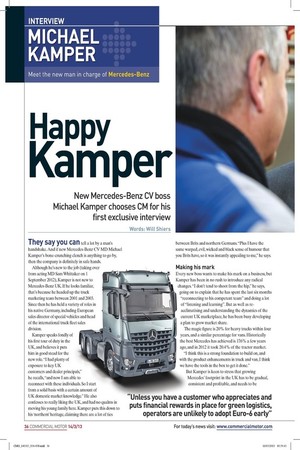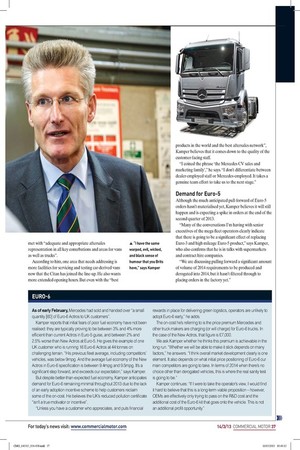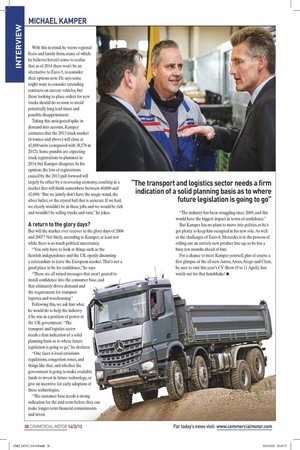Happy Kamper New Mercedes-Benz CV boss Michael Kamper chooses CM
Page 23

Page 24

Page 25

If you've noticed an error in this article please click here to report it so we can fix it.
for his first exclusive interview woras: WILL bniers They say you can tell a lot by a man's handshake. And if new Mercedes-Benz CV MD Michael Kamper's bone-crunching clench is anything to go by, then the company is definitely in safe hands.
Although he's new to the job (taking over from acting MID Sam Whittaker on 1 September 2012), Kamper is not new to Mercedes-Benz UK. If he looks familiar, that's because he headed up the truck marketing team between 2001 and 2003. Since then he has held a variety of roles in his native Germany, including European sales director of special vehicles and head of the international truck fleet sales division.
Kamper speaks fondly of his first tour of duty in the UK, and believes it puts him in good stead for the new role. "I had plenty of exposure to key UK customers and dealer principals," he recalls, "and now Tamable to reconnect with these individuals. So I start from a solid basis with a certain amount of UK domestic market knowledge." He also confesses to really liking the UK, and had no qualms in moving his young family here. Kamper puts this down to his 'northern' heritage, claiming there are a lot of ties between Brits and northern Germans. "Plus I have the same warped, evil, wicked and black sense of humour that you Brits have, so it was instantly appealing to me," he says.
Making his mark Every new boss wants to make his mark on a business, but Kamper has been in no rush to introduce any radical changes. "I don't tend to shoot from the hip," he says, going on to explain that he has spent the last six months "reconnecting to his competent team" and doing a lot of "listening and learning". But as well as reacclimatising and understanding the dynamics of the current UK marketplace, he has been busy developing a plan to grow market share.
The magic figure is 20% for heavy trucks within four years, and a similar percentage for vans. Historically the best Mercedes has achieved is 17.6% a few years ago, and in 2012 it took 20.4% of the tractor market.
"I think this is a strong foundation to build on, and with the product enhancements in truck and van, I think we have the tools in the box to get it done."
But Kamper is keen to stress that growing Mercedes' footprint in the UK has to be gradual, consistent and profitable, and needs to be met with "adequate and appropriate aftersales representation in all key conurbations and areas for vans as well as trucks".
According to him, one area that needs addressing is more facilities for servicing and testing car-derived vans now that the Citan has joined the line-up. He also wants more extended opening hours. But even with the "best products in the world and the best aftersales network", Kamper believes that it comes down to the quality of the customer-facing staff.
"I coined the phrase 'the Mercedes CV sales and marketing family'," he says. "I don't differentiate between dealer-employed staff or Mercedes-employed. It takes a genuine team effort to take us to the next stage."
Demand for Euro-5 Although the much anticipated pull-forward of Euro-5 orders hasn't materialised yet, Kamper believes it will still happen and is expecting a spike in orders at the end of the second quarter of 2013.
"Many of the conversations I'm having with senior executives of the mega fleet operators clearly indicate that there is going to be a significant effect of replacing Euro-3 and high mileage Euro-5 product," says Kamper, who also confirms that he is in talks with supermarkets and contract hire companies.
"We are discussing pulling forward a significant amount of volume of 2014 requirements to be produced and derogated into 2014, but it hasn't filtered through to placing orders in the factory yet." With this in mind, he warns regional fleets and family firms, many of which he believes haven't come to realise that as of 2014 there won't be an alternative to Euro-5, to consider their options now. He says some might want to consider extending contracts on current vehicles, but those looking to place orders for new trucks should do so soon to avoid potentially long lead times and possible disappointment.
Taking this anticipated spike in demand into account, Kamper estimates that the 2013 truck market (6 tonnes and above) will close at 42,000 units (compared with 38,576 in 2012). Some pundits are expecting truck registrations to plummet in 2014, but Kamper disagrees. In his opinion, the loss of registrations caused by the 2013 pull-forward will largely be offset by a recovering economy, resulting in a market that will finish somewhere between 40,000 and 42,000. "But we jointly don't have the magic wand, the silver bullet, or the crystal ball that is accurate. If we had, we clearly wouldn't be in these jobs and we would be rich and wouldn't be selling trucks and vans," he jokes.
A return to the glory days?
But will the market ever recover to the glory days of 2006 and 2007? Not likely, according to Kamper, at least not while there is so much political uncertainty.
"You only have to look at things such as the Scottish independence and the UK openly discussing a referendum to leave the European market. That's not a good place to be for confidence," he says.
"These are all mixed messages that aren't geared to install confidence into the consumer base, and that ultimately drives demand and the requirement for transport logistics and warehousing."
Following this, we ask him what he would do to help the industry if he was in a position of power in the UK government. "The transport and logistics sector needs a firm indication of a solid planning basis as to where future legislation is going to go," he declares.
"One facet is local emissions regulations, congestion zones, and things like that, and whether the government is going to make available funds to invest in future technology, or give an incentive for early adoption of these technologies.
"The customer base needs a strong indication for the mid-term before they can make longer-term financial commitments and invest. "The industry has been struggling since 2009, and this would have the biggest impact in terms of confidence."
But Kamper has no plans to move into politics, as he's got plenty to keep him occupied in his new role. As well as the challenges of Euro-6, Mercedes is in the process of rolling out an entirely new product line-up, so he has a busy few months ahead of him For a chance to meet Kamper yourself, plus of course a first glimpse of the all-new Antos, Arocs, Atego and Citan, be sure to visit this year's CV Show (9 to 11 April). Just watch out for that handshake! • EURO-6 As of early February, Mercedes had sold and handed over "a small quantity [60] of Euro-6 Actros to UK customers".
Kamper reports that initial fears of poor fuel economy have not been realised: they are typically proving to be between 3% and 4% more efficient than current Actros in Euro-5 guise, and between 2% and 2.5% worse than New Actros at Euro-5. He gives the example of one UK customer who is running 16 Euro-6 Actros at 44 tonnes on challenging terrain. "His previous fleet average, including competitors' vehicles, was below 9mpg. And the average fuel economy of the New Actros in Euro-6 specification is between 9.4mpg and 9.5mpg. It's a significant step forward, and exceeds our expectation," says Kamper.
But despite better-than-expected fuel economy, Kamper anticipates demand for Euro-6 remaining minimal throughout 2013 due to the lack of an early adoption incentive scheme to help customers reclaim some of the on-cost. He believes the UK's reduced pollution certificate "isn't a true motivator or incentive".
"Unless you have a customer who appreciates, and puts financial rewards in place for delivering green logistics, operators are unlikely to adopt Euro-6 early," he adds.
The on-cost he's referring to is the price premium Mercedes and other truck makers are charging (or will charge) for Euro-6 trucks. In the case of the New Actros, that figure is £7,000.
We ask Kamper whether he thinks this premium is achievable in the long run. "Whether we will be able to make it stick depends on many factors," he answers. "I think overall market development clearly is one element. It also depends on what initial price positioning of Euro-6 our main competitors are going to take. In terms of 2014 when there's no choice other than derogated vehicles, this is where the real sanity test is going to be."
Kamper continues: "If I were to take the operator's view, I would find it hard to believe that this is a long-term viable proposition — however, OEMs are effectively only trying to pass on the R&D cost and the additional cost of the Euro-6 kit that goes onto the vehicle. This is not an additional profit opportunity."






































